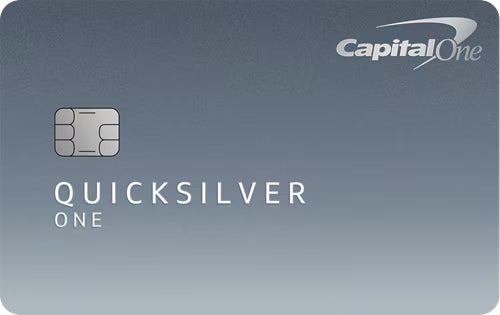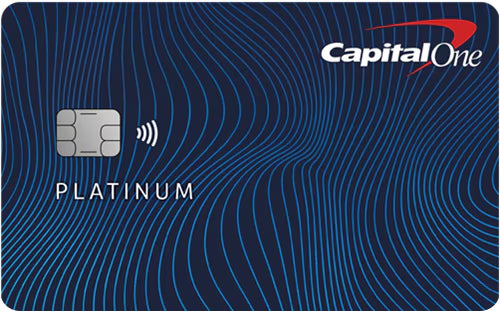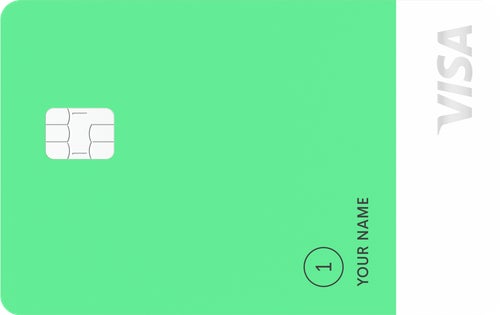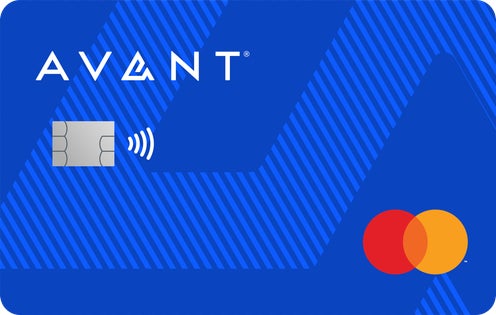| Credit Building Rating: | 2.8 / 5 |
| Cost of Membership | 3.0 |
| Ease of Building Credit | 4.5 |
| APR | 2.0 |
| Features | 2.5 |
In a Nutshell:
If you need to build credit but don’t want to tie up hundreds of dollars in a security deposit, the Avant Credit Card could be a good fit, offering a chance to improve your score or establish a solid credit foundation at a relatively low cost.
Average cost of membership per year |  |
Security deposit required |  |
Credit limit |  |
Access to higher credit line? |  |
APR |  |
Annual fee |  |
Other rates and fees
|  |
Other notable features: Instant approval available, soft pull prequalification, zero fraud liability
What are the pros and cons?
Pros
- Helps build credit history with responsible use by reporting to the three major credit bureaus
- Does not require a security deposit, reducing upfront costs
- Prospective users can prequalify with no risk to their credit scores, a rare feature among unsecured cards
Cons
- This card carries an annual fee ($0 to $59, depending on your creditworthiness)
- Offers a low starting credit limit of $300, which can be a hurdle for low credit utilization ratio
- This card does not offer a rewards program or specific credit-building features that are common with competitors
Why you might want the Avant Credit Card
Geared toward credit-builders with fair credit, the Avant card is thin on perks but carries a reasonable annual fee, offers a decent starting credit limit and since it’s an unsecured card, it doesn’t require a deposit. The card also gives you a chance to prequalify with only a “soft pull” of your credit report, which has no impact on your credit score.
Building credit with the Avant card
Despite its shortcomings, the Avant card should do the job for credit-builders. It reports to all three credit bureaus – Experian, TransUnion and Equifax – and its $0 deposit requirement gives it a low entry barrier, even if you have a middling or limited credit history.
Since credit utilization – the amount of money you’ve borrowed relative to the amount of credit available across all your accounts – makes up 30% of your FICO credit score, your credit limit can play a key role in your credit-building efforts. If you qualify for the $1,000 limit on the Avant card, you may have an easier time keeping your credit utilization in check, since you’ll have more breathing room to make everyday purchases while keeping your utilization low. The card’s issuer also notes that it may periodically review your account for credit line increases. However, it offers no definitive timeline for an increase (Capital One, for example, usually promises to review your account for a credit limit increase if you make your first six payments on time).
Though the Avant card is worth a look if a high credit limit is one of your top priorities, it’s not the only card available at this credit level that offers a chance at a high limit. The Petal® 1 “No Annual Fee” Visa® Credit Card, for example, offers a chance at an up to $5,000 limit, and the Petal® 2 “Cash Back, No Fees” Visa® Credit Card offers limits as high as $10,000. Of course, you’re not guaranteed anywhere close to that limit – it depends on your credit profile.
A secured card could be the way to go if you want more control over your credit limit. Since your credit limit on a secured card typically matches your deposit, you can put down a large deposit on a high-limit secured card and enjoy much more flexibility while keeping your credit utilization low. The downside is you’ll need to keep that money tied up for some time while you work on your score.
If you get the Avant card, stay on top of payments and keep your balances on the low side – preferably under 10% of your available credit ($100 owed with $1,000 in available credit) – to boost your credit as much as possible. At the absolute maximum, you should keep your utilization below 30% of your available credit.
See related: What affects your credit score?
Preapproval and instant approval
The Avant card is aimed toward cardholders with at least a fair or average credit score (a FICO score of 580 to 669), but having a score in that range doesn’t guarantee approval.
Luckily, you can check if you’re preapproved for the Avant card at the issuer’s website or via CardMatch. This only requires a soft pull of your credit report and won’t impact your credit score (you’ll only face a “hard pull” when you submit a formal application, which will temporarily lower your score). Though it’s no guarantee of approval, getting preapproved this way – or getting a prescreened card offer from Avant – should help you feel more comfortable about your approval odds.
One big plus of the process is that the card offers instant approval, with Avant promising to give applicants a decision one way or another in as little as 60 seconds. Keep in mind, however, that instant approval is not the same as an instant use credit card – you’ll still need to wait for your Avant card to arrive in the mail before you can use it. Also, your Avant card annual fee and APR may differ if you apply outside of CreditCards.com.
Why you might want a different card
There are cheaper credit-building options available – both secured and unsecured. If you have at least fair credit, you can find an unsecured card that charges no annual fee while offering better long-term value and perks. If you’re willing to (temporarily) put down money in a security deposit, a secured credit card will likely prove not only less expensive but also more effective at helping you build credit.
Card rates and fees
As is common with unsecured credit-building cards, you must pay an annual fee to use the Avant card. However, the card’s annual fee will set you back up to $59 – about half the cost of many unsecured cards for people with a damaged or limited credit history. Indeed, some credit-building cards charge close to double this in annual fees and can even increase your annual fee in the second year or tack on additional maintenance or activation fees (especially if you have bad credit).
That said, the Avant card is far from the cheapest unsecured credit-building card available with fair credit. Both the Jasper Cash Back Mastercard®* and Capital One Platinum Credit Card charge no annual fee, and the Capital One QuicksilverOne Cash Rewards Credit Card offers a generous 1.5% cash back on every purchase you make, which could help offset its $39 annual fee. Meanwhile, plenty of secured cards charge no annual fee and refund your security deposit when you close the account or “graduate” to an unsecured card.
With this in mind, the Avant card, though relatively low-cost, may only be worth it if you can’t qualify for a no-annual-fee credit-building card.
The Avant card also carries a high APR regardless of your credit score or history. Since this card is available for individuals with fair credit, it makes sense that its APR is much higher than the national average credit card APR, but it is high even compared to the average APR on cards for people with bad credit. While this rate won’t affect you if you pay your balance in full each billing cycle, it could get you into big trouble if you carry a balance.
Other fees to watch out for include a cash advance fee of 3% (minimum $10) and a late fee of up to $39. However, you can avoid these fees by not using your card for a cash advance and always paying your credit card bill on time, which is already a key part of building good credit. On the plus side, the card carries no penalty APR, so you won’t face a higher APR if you struggle to pay on time.
Lack of perks
Considering the Avant card is designed for people with imperfect credit, it’s no surprise that it offers few perks.
Along with its relatively low cost, $0 deposit requirement, decent credit limit range and standard perks like zero fraud liability, the card’s most notable perk is its lack of foreign transaction fees. While many cards, including some of the best credit cards on the market, charge a 3% fee for every purchase you make abroad, the Avant card doesn’t charge any extra fees when you use the card overseas or with an international merchant. The Avant card is also a Mastercard credit card, so it enjoys broad acceptance worldwide.
That said, several cards available at this credit level beat the Avant card when it comes to benefits, offering extras like cash back on some or all of your purchases, which can go a long way toward justifying their cost. The Credit One Bank® Premier American Express® Card , for example, comes with 1% back on all purchases, a $500 minimum credit limit and benefits like car rental insurance, travel accident insurance, purchase and return protection and extended warranty coverage, all for a $39 annual fee.
While building credit should be your primary focus at this stage, the absence of these perks will limit the Avant card’s long-term value.
How does the Avant card compare to other credit-building cards?
Though the Avant card can be a decent choice if you’re looking for a credit card to help you build credit while keeping costs low, it’s not your only option. In fact, several unsecured cards available with fair credit charge lower annual fees while offering better perks and long-term value. Consider these alternatives before you apply for the Avant card:
 |  |  |
Rewards rate
| Rewards rate
| Rewards rate
|
Credit limit
| Credit limit
| Credit limit
|
| Annual fee $39 | Annual fee $0 | Annual fee $0 |
Other things to know
| Other things to know
| Other things to know
|
Avant Credit Card vs. Capital One QuicksilverOne Cash Rewards Credit Card
You could look at the Capital One QuicksilverOne card as a better version of the Avant card. Like the Avant card, the QuicksilverOne is available with fair or average credit and has no deposit requirement. What sets it apart is its unlimited 1.5% cash back rate on every purchase, which will help cover the card’s annual fee and rivals the rate you’ll find on some of the best flat-rate cash back cards on the market. Plus, once your score improves, you may be able to upgrade to a new Capital One rewards card without putting in a fresh application.
Avant Credit Card vs. Capital One Platinum Credit Card
If keeping costs low is your top priority, the Capital One Platinum card will be one of your best options with fair or average credit. While it doesn’t come with rewards or spectacular perks, the Platinum card carries no annual or foreign transaction fee, doesn’t require a security deposit and gives you a chance at a credit line increase if you make your first six card payments on time. Use the card responsibly, and you should be able to build your credit at no cost.
Avant Credit Card vs. Petal® 1 “No Annual Fee” Visa® Credit Card
If you haven’t had any luck getting approved for a card designed for people with fair credit, the Petal 1 “No Annual Fee” Visa Credit Card could be a terrific option. Though the card is available even with a fair credit score (below 580), it charges no annual fee and offers a minimum starting credit limit of $300. The issuer can also consider more than just your credit score when you apply, including your income and bill payment history, so it may be a great fit if you’ve struggled with credit in the past but are otherwise in good financial shape.
Who should get the Avant Credit Card?
- Credit-builders who want to avoid tying up money in a security deposit.
- People with fair credit looking for cards that offer preapproval.
- People hoping for a higher-than-average credit limit on an unsecured credit-building card.
- People who’ve struggled to qualify for a credit-building card with no annual fee.
How to use the Avant Credit Card
- Use your card for small purchases you can pay off each month to keep your credit utilization low.
- After you’ve used the card responsibly for several months, contact the issuer to see if you can be considered for a credit line increase.
- Use the card overseas for its 0% foreign transaction fees.
- Monitor your credit score and consider applying for a better card when you get closer to the “good” credit level (a FICO score of 670 to 739).
Is the Avant card worth it?
While it’s not the cheapest credit-building option for people with fair or average credit, the Avant card could make sense if you’re set on avoiding a security deposit and haven’t been able to get approved for an unsecured credit-building card that charges no annual fee. The card carries a reasonable annual fee, offers a chance at a better-than-average starting credit limit and carries no foreign transaction fee, making it a decent, if imperfect, stopgap option.
Before you apply, though, be sure to check out other credit-building cards – both secured and unsecured – that don’t charge an annual fee. Along with a lower cost of ownership, several such cards offer a minimum of 1% back on all spending and clearer guidance on getting a credit line increase and more options should you want to upgrade down the road.
*All information about the Jasper Cash Back Mastercard has been collected independently by CreditCards.com. The issuer did not provide the content, nor is it responsible for its accuracy.
All reviews are prepared by CreditCards.com staff. Opinions expressed therein are solely those of the reviewer and have not been reviewed or approved by any advertiser. The information, including card rates and fees, presented in the review is accurate as of the date of the review. Check the data at the top of this page and the bank’s website for the most current information.
Responses to comments in the discussion section below are not provided, reviewed, approved, endorsed or commissioned by our financial partners. It is not our partner’s responsibility to ensure all posts or questions are answered.
Partner Offer
